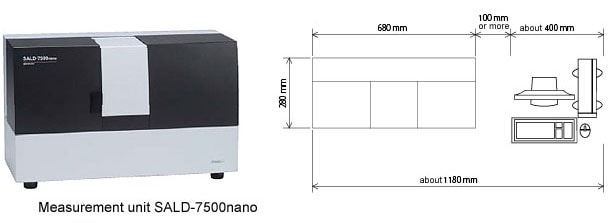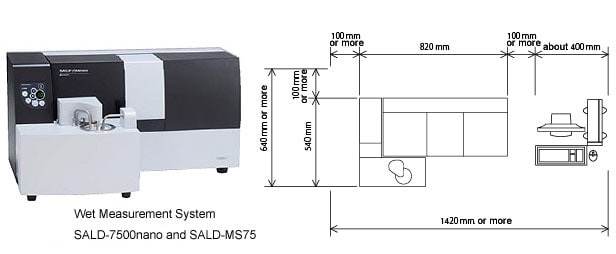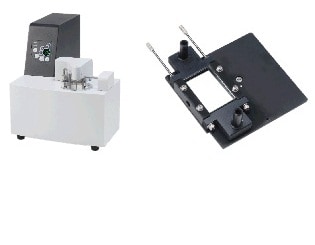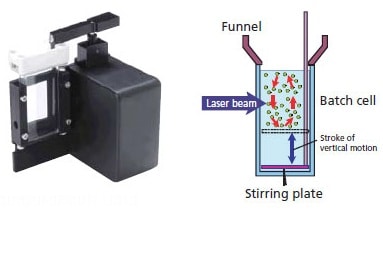SALD-7500nano - Specs
Nano Particle Size Analyzer
System Structure
An evolved nano particle size analyzer for accurate evaluation of nano particles
Main unit (Measurement unit): SALD-7500nano
- Violet semiconductor laser (wavelength: 405 nm) is used for the light source. Maintenance, such as gas replacement, is unnecessary.
- The detector incorporates 78 elements at the front, one element at the side, and 5 elements at the back for a total of 84 elements. Additionally, high-sensitivity light receptors that support violet semiconductor laser wavelengths are adopted with all detectors.
- The fixed parts of the cell and cell holder can be pulled out at the front of the unit using a slide mechanism. This makes it easy to mount and replace cells, and to perform maintenance.
- WingSALD ll software is supplied as standard. It offers versatile data processing and simple, high-speed operation to suit every purpose and processing requirement.
Add optional units to the SALD-7500nano to design a wide range of systems.

Small-volume Measurement System (SALD-7500nano and SALD-BC75)
High-Concentration Sample Measurement System (SALD-7500nano and SALD-HC75)
Ultra Small-Volume Measurement System (SALD-7500nano and SALD-HC75 and “Glass Slides with Indentation”)

Easy Measurement under PC Control
Sampler SALD-MS75

- Groups of particles are dispersed in a liquid medium and measured as they are circulated between the flow cell, which is placed in the measurement unit, and a dispersion bath in the sampler.
- The dispersion bath incorporates a stirrer and an ultrasonic sonicator. A pump delivers the dispersed suspension to the flow cell.
- The pump is specially designed to ensure both liquid medium and the particles are circulated. A stainless ball of 2 mm circulates and it is possible to measure it.
- It can be controlled from a PC.
- Most organic solvents can be used as dispersion media.
Sample Unit SALD-MS75 Solvent Resistance

|
Note1 |
Solvent resistance toward materials used in the passageways of SALD-MS75. Solvent resistance values are representative, and are not certified. |
|
Note2 |
Only applicable for liquid pump. Not applicable for liquid supply pump. |
|
Note3 |
Ultrasonic cleaning instruments are needed for the measurement of reference sample. |

Measurement data

Ideal for Measurement with Small Amounts of Organic Solvent
Batch Cell SALD-BC75

- Measurement is possible with a small amount of sample (i.e., measured particles) and liquid medium (i.e., dispersion medium).
- The capacity of the batch cell is only 7cm3 an so waste treatment for the suspension canbe performed with relatively small amounts.
- The vertical motions of the stirring plate prevent sedimentation of the particles.
- The funnel reduces the possibility of sample spillage.
- A tetrafluoroethylene resin funnel is provided to reduce the possibility of suspension getting on the hands of the user. It also prevents the cell surface from becoming dirty.
Measurement data

Measurement Samples without Dilution
High-Concentration Sample Measurement System: SALD-HC75
- High-concentration samples can be measured using the laser diffraction method.
- Measurement is possible by simply holding the high-concentration sample particles to be measured between two glass slides.
- Samples for which the particle size distribution would be changed by dilution can be measured in their original state, or with the minimum required level of dilution, and a true image of the measurement object can be obtained.
- Commercial hand creams, face creams, and rinses can be measured with hardly any pretreatment.

If a standard flow cell or batch cell is used to measure a sample at a high concentration, the long light pathlength results in multiple scattering, making it difficult to obtain accurate measurements.
With this system, however, it is possible to hold the high-concentration sample particles between two glass slides, which shortens the length of the light paths, avoids the negative effects of multiple scattering and makes accurate measurement possible.
Glass sample plates (glass with indentation) (Option)

Effective for measuring samples with relatively low concentrations, or expensive samples that can only be used in small amounts.
Measurement Data

SALD-7500nano
General Specifications
| Measurement principle |
Laser Diffraction Method |
|---|---|
| Measurement range |
7 nm (0.007 μm) to 800 μm (when using sampler) |
Note 1: The measurement range varies according to the shape etc. of the particle.
SALD-7500nano
Measurement unit
| Light source |
Semiconductor laser (Wavelength 405 nm) |
|---|---|
| Light detector |
Detector elements for violet semiconductor laser Total 84 elements |
| System Compliance |
Class 1 Laser Product, CE |
| Required power supply |
AC 100 V±10%, 1 A, 50/60 Hz |
| Dimensions & weight |
Approx. 680 × D280 × H430 mm, Approx.32 kg |
| Operation environment |
Temperature : 10 to 30°C , Humidity : 20 to 80% (no condensation) |
Note 2: Reference sample and USB cable (2 m) supplied as standard
Note 3: Ultrasonic cleaning instruments are needed for the measurement of reference sample.
SALD-MS75
Sampler
| Dispersing bath |
Capacity : 100 / 200 / 300 mL |
|---|---|
| Sonicator |
Frequency : about32 kHz, output : about 40 W |
| Liquid Pump |
Radial pump, maximum flow rate 2000 cm3/min |
| Liquid Pump Material |
Stainless (SUS 304, SUS 316), Tetrafluoroethylene (PTFE), |
| Liquid Supply Pump |
Diaphragm pump, maximum flow rate : 750cm3/min |
| Liquid Supply Pump Material |
Polypropylene |
| Flow Cell |
Quartz glass |
| Required power supply |
AC 100 V±10%, 2 A, 50/60 Hz |
| Dimensions & weight |
Approx. W390 × D520 × H430 mm, Approx.18 kg |
| Operating Environment |
Temperature: 10 to 30°C, Humidity: 20 to 80% (no condensation) |
Note 4: USB cable (2 m) supplied as standard
WingSALD II
Measurement and Data Display Functions
| Measurement of Particle Size Distribution |
Allows measurements using measurement assistant unction (interactive process based on SOP) and manual mode |
|---|---|
| Automatic Calculation of Refractive Index |
Automatic calculation by Light Intensity Distribution Reproduction (LDR) method based on specified substance name or range |
| Real-Time Display |
Particle size distribution / Light intensity distribution simultaneous display |
| Recalculation of Particle Size Distribution |
Max. 200 data batch calculation or individual data calculation |
| Display of Particle Size Distribution Data |
Max. 200 data overlay graph or individual data graph |
| Display of Light Intensity Distribution |
Max. 200 data overlay graph or individual data graph |
| Diagnostics/Adjustments |
Self-diagnostic functions |
| Statistical Data Processing |
Max. 200 data (Max. 200 data overlay graph) |
| Time Series Analysis |
Max. 200 data |
| 3-Dimensional Graph |
Max. 200 data |
| Data Transfer via Clipboard |
Image Output, Image Output |
| Data Sorting |
Sort by file name, sample ID, sample number, or refractive index. |
Note 5: The Light Intensity Distribution Reproduction (LDR) method calculates the refractive index from the conformity between the measured light intensity distribution pattern and the light intensity distribution data reproduced (calculated) from the particle size distribution data. LDR is a proprietary method developed by Shimadzu. Two papers have been published on this method. It is sometimes called the "Kinoshita Method" at academic conferences.
WingSALD II
Output Conditions
| Particle Size Distribution (μm) Number of Divisions |
Fixed 51 / 101 divisions / Optional (can be set by user) 51 divisions * 10 tables |
|---|---|
| Particle Mass Distribution (%) Number of Divisions |
Fixed 51 divisions, Optical (can be set by user) 51 divisions * 10 tables |
| Dimension of Particle Amount |
Count, length, area or volume |
| Expression of Cumulative Distribution |
Undersize, oversize |
| Expression of Data Frequency |
q, q / Δ×, q / Δlog× |
| Smoothing Level |
10 Level |
| Distribution Function Fitting |
Rosin-Rammler distribution, logarithmic Gaussian distribution |
| Data Shifting |
±10 levels |
| Report Functions |
Batch output possible by selecting single data, overlay data, statistical data, time-series data, or 3D data |
WingSALD II
Data Analysis
| Scattering Angle Evaluation |
Max. 200 data overlay graph or individual data graph |
|---|---|
| Data Conversion Function |
Emulation of particle distribution data by other instruments or measuring principles |
| Mixing Simulation Function |
Max. 6 points |
| Data Connection Function |
2 data connections |
| Continuous Measurements Function |
Measurement interval: 1 s min., Save up to 200 data points |
Downloads
Download the latest brochure.




